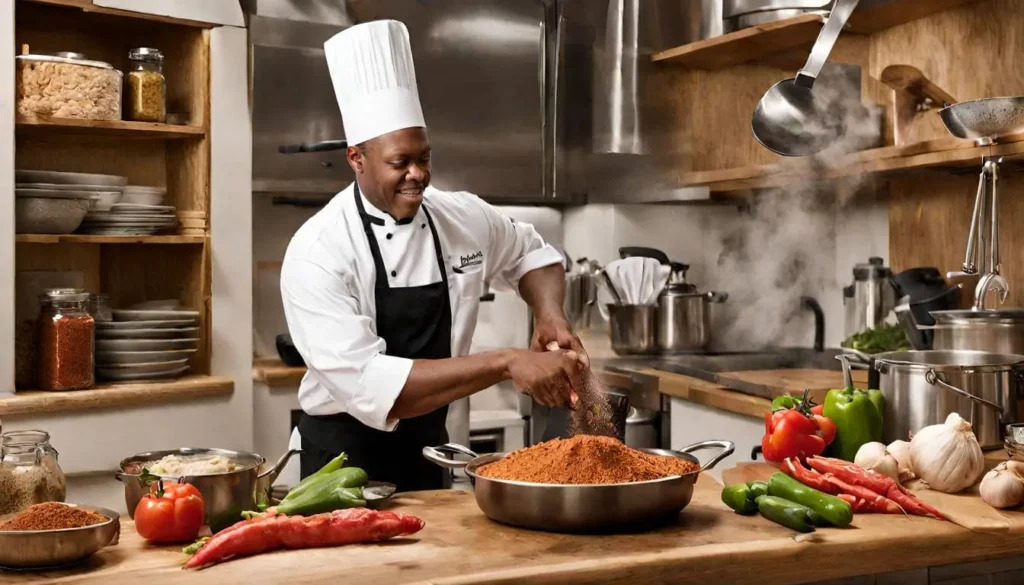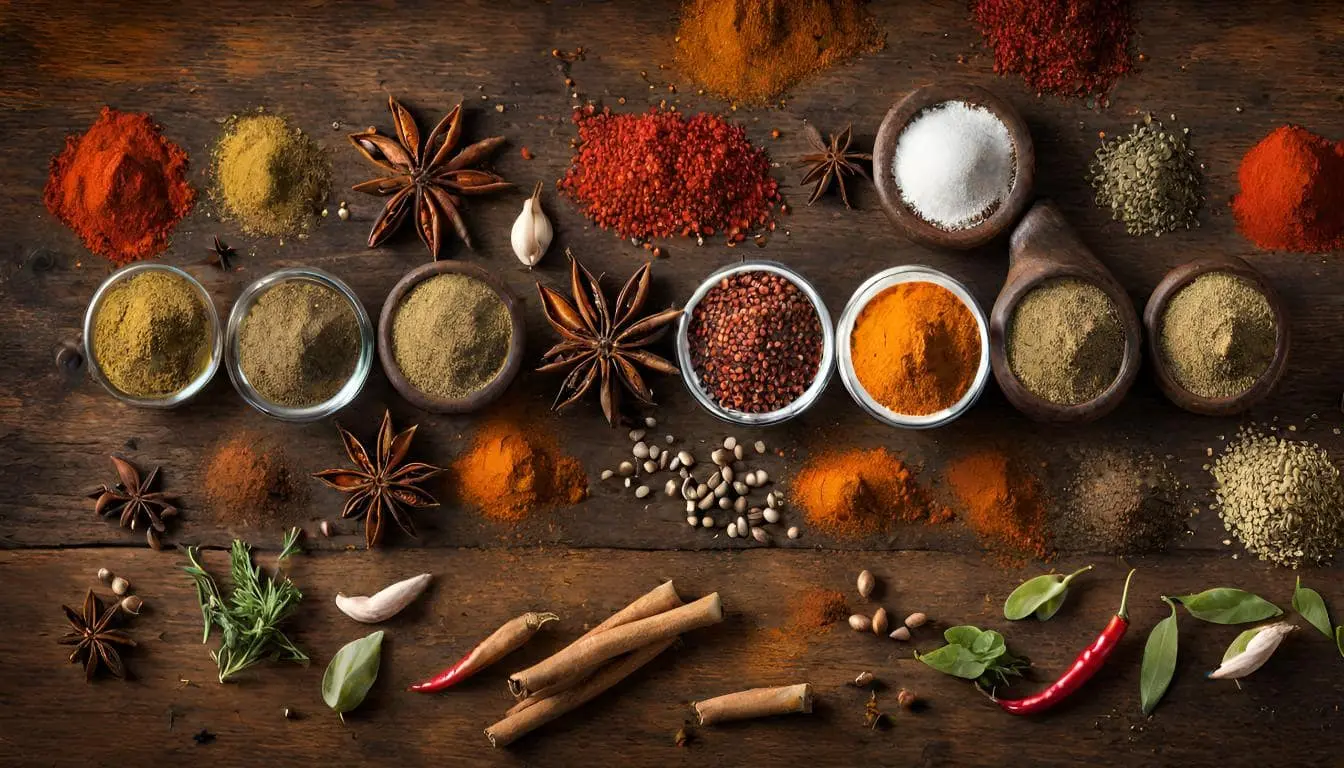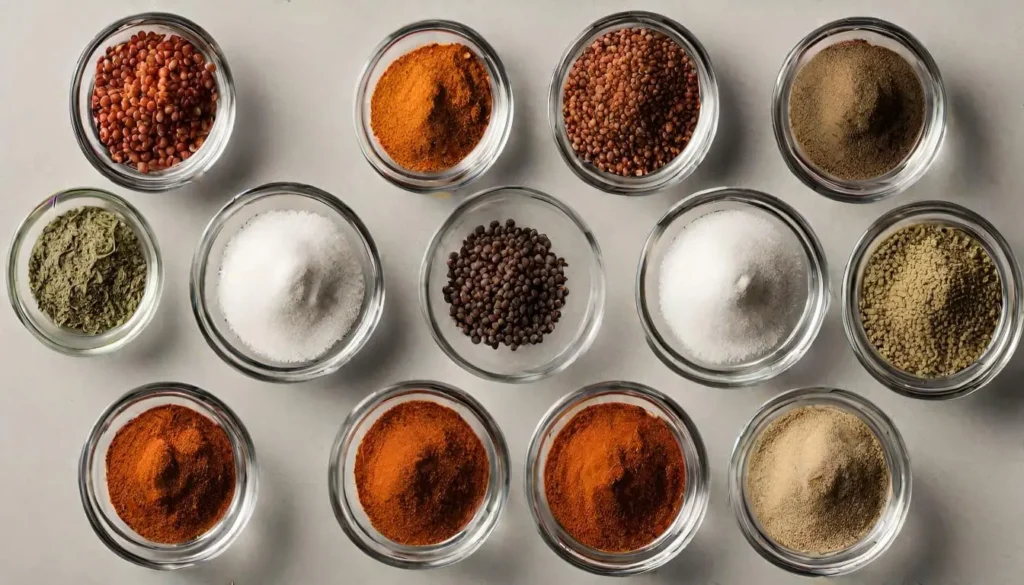Louisiana Cajun Seasoning
The Essence of Cajun Flavor
Louisiana Cajun seasoning is, quite frankly, the heart and soul of Cajun cuisine. It’s a robust, earthy, and sometimes fiery blend that packs a punch in terms of flavor. The essence of this seasoning lies in its ability to marry a variety of spices into a harmonious blend. Each spoonful of Cajun seasoning brings a burst of flavors that are quintessential to the Southern palate.
Historical Roots and Cultural Significance
The roots of Cajun seasoning stretch back to the arrival of French settlers in Louisiana. These settlers, adapting to their new environment, fused their culinary traditions with the ingredients available in the region. Consequently, this blend of cultures gave birth to Cajun cuisine, with its seasoning being a cornerstone.
Cajun seasoning isn’t just a spice mix; it’s a cultural emblem. It represents a history of adaptation and survival, a testament to the resilience of the Cajun people. Furthermore, this seasoning has transcended its humble beginnings to become a beloved staple in kitchens far beyond Louisiana.
Key Ingredients and Flavor Profile
Common Ingredients in Cajun Seasoning
At the heart of every jar of Louisiana Cajun seasoning lies a blend of several key ingredients, each contributing its unique character. The most common staples include paprika, which imparts a vibrant color and a sweet, smoky undertone. Garlic powder and onion powder add depth and a robust aroma, essential for that mouth-watering Cajun allure. Then there’s the heat – cayenne pepper and black pepper provide a fiery kick, a signature element of Cajun cuisine. Other frequent additions are oregano and thyme, offering a hint of herby freshness.
Understanding the Spicy and Savory Blend
The magic of Cajun seasoning lies in its intricate balance of spicy and savory. This blend isn’t just about bringing the heat; it’s about creating a symphony of flavors. The spiciness from cayenne and black pepper tingles the palate, while the savory notes from garlic and onion round out the taste. This interplay results in a seasoning that’s versatile and dynamic, capable of enhancing a wide range of dishes without overpowering them.
Regional Variations in Recipes
Louisiana’s diverse culinary landscape has given rise to various regional interpretations of Cajun seasoning. Some areas might lean towards a spicier mix, amping up the cayenne and black pepper. Others might emphasize herbal notes, adding more oregano or thyme. In some family recipes, you might even find unique additions like mustard powder or celery seed, each adding a personal touch to the blend. These regional variations showcase the adaptability of Cajun seasoning, making it a truly customizable cornerstone of Southern cooking.
Top Commercial Cajun Seasonings
Overview of Popular Brands
When it comes to commercial Cajun seasonings, the market is as varied as the flavors of Louisiana itself. Leading the pack is McCormick Gourmet Collection Cajun Seasoning, a household name synonymous with quality. Another fan favorite is Slap Ya Mama All Natural Cajun Seasoning, known for its straightforward yet bold flavor profile. For those seeking an organic option, Frontier Cajun Seasoning Certified Organic stands out with its commitment to natural ingredients. Each brand brings its unique twist to the classic Cajun blend, catering to a range of palates and preferences.
Comparison of Flavor and Ingredients
Delving into the flavor and ingredients of these top contenders, we notice distinct differences. McCormick’s blend is noted for its well-rounded taste, combining garlic, black pepper, cayenne pepper, and a hint of bell peppers. It strikes a balance between spicy and savory, making it a versatile choice for various dishes. On the other hand, Slap Ya Mama offers a more streamlined approach, focusing on salt, red pepper, black pepper, and garlic, delivering a straightforward Cajun kick. Frontier sets itself apart by omitting salt entirely, relying on a mix of paprika, onion, garlic, and herbs to provide a flavorful yet health-conscious option.
Consumer Reviews and Recommendations
Consumer feedback is invaluable in gauging the real-world appeal of these seasonings. McCormick’s blend often receives praise for its all-natural ingredients and user-friendly packaging, making it a go-to for both novice cooks and seasoned chefs. Slap Ya Mama’s seasoning is lauded for its authentic Cajun heat, perfect for those who love a spicy touch in their cooking. Frontier’s organic option is a hit among health-conscious consumers, appreciated for its organic certification and unique flavor profile without added salt.
Homemade Cajun Seasoning Recipes
Basic Homemade Recipe
Embarking on the adventure of creating your own Cajun seasoning at home is not just simple; it’s a delightful journey into the heart of Louisiana’s culinary tradition. Firstly, start with a base of paprika for warmth and color, and then add garlic powder and onion powder for depth. The heat comes from cayenne pepper – adjust this according to your spice tolerance. Moreover, black pepper adds a sharp bite, while dried oregano and thyme introduce an herby complexity. Consequently, a typical blend might include:
- 2 tablespoons paprika
- 2 tablespoons garlic powder
- 1 tablespoon onion powder
- 1 tablespoon cayenne pepper
- 1 tablespoon black pepper
- 1 tablespoon dried oregano
- 1 tablespoon dried thyme
Mix these ingredients thoroughly for a classic homemade Cajun seasoning. This blend, once prepared, not only brings the authentic flavors of Louisiana to your kitchen but also allows for a personal touch in your culinary creations.
Variations and Personalization
The beauty of homemade seasoning is the freedom to tailor it to your taste. For instance, for a smokier flavor, consider adding smoked paprika. If you’re watching your sodium intake, you can reduce or omit salt. Furthermore, for an extra kick, increase the cayenne pepper or add red pepper flakes. Some might even enjoy a hint of sweetness – a pinch of brown sugar can do wonders. Experimenting with different ratios and ingredients allows you to create a Cajun seasoning that’s uniquely yours.
Tips for Storage and Shelf Life
Proper storage is key to maintaining the freshness and potency of your homemade Cajun seasoning. Firstly, store it in an airtight container in a cool, dark place to prevent the spices from losing their flavor. Avoid moisture, as it can lead to clumping and spoilage. Generally, a well-stored homemade Cajun seasoning can last up to six months. Moreover, remember, the fresher the spices, the more vibrant the flavors in your seasoning will be.
Cooking with Louisiana Cajun Seasoning
Popular Dishes and Pairings
Cajun seasoning, with its robust and versatile flavor profile, is a game-changer in the kitchen. It’s the secret ingredient that can elevate a simple dish to a memorable feast. Classic Cajun dishes like jambalaya and gumbo are, of course, incomplete without this spice blend. However, its use extends far beyond these traditional recipes. Cajun seasoning can add a zesty kick to grilled chicken, transform a bland piece of fish into a culinary delight, and even spice up your vegetable stir-fries. It’s also perfect for seasoning shrimp, whether in a shrimp boil or a sauté. The key is to pair it with ingredients that can stand up to its bold flavors, like sausage, pork, or robust vegetables like bell peppers and onions.
Tips for Balancing Flavors
While Cajun seasoning is undoubtedly flavorful, it’s important to use it judiciously to avoid overpowering your dish. Start with a small amount and taste as you go, especially if you’re not accustomed to spicy foods. Remember, it’s easier to add more than to fix a dish that’s become too spicy. Additionally, balancing the heat with acidic components like lemon juice or tomatoes can create a more rounded flavor profile. If you find your dish too spicy, dairy products like cream or yogurt can help mellow the heat.
Creative Uses in Everyday Cooking
Cajun seasoning isn’t just for traditional Southern dishes; it can be a versatile addition to your everyday cooking. Try sprinkling it on popcorn for a spicy snack, or mix it into your burger patties for a Cajun twist. It can also add a flavorful punch to breakfast dishes like scrambled eggs or avocado toast. The possibilities are endless, and a little creativity can lead to delicious discoveries.
Health and Dietary Considerations
Sodium Content and Alternatives
One of the primary health considerations with Cajun seasoning, as with many spice blends, is its sodium content. Traditional recipes often include salt, which can be a concern for those monitoring their sodium intake. However, the good news is that there are several alternatives. Opting for a homemade Cajun seasoning allows you to control the amount of salt added. Alternatively, many brands offer low-sodium or even salt-free versions of Cajun seasoning, ensuring that you can enjoy its vibrant flavors without compromising your health goals. Additionally, using herbs and spices like garlic powder and cayenne pepper can enhance flavors without the need for excess salt.
Allergies and Sensitivities
For those with food allergies or sensitivities, it’s important to carefully read the labels of commercial Cajun seasonings. Some blends may contain additives or ingredients like MSG, which can cause reactions in sensitive individuals. Homemade blends offer a safer alternative, as you can tailor the ingredients to avoid any known allergens. It’s also a good practice to be aware of cross-contamination, especially if the seasoning is packaged or processed in facilities that handle allergens.
Organic and Natural Options
For health-conscious consumers, organic and natural Cajun seasonings are increasingly available. These options are free from artificial additives, preservatives, and often non-GMO. They provide a purer, often more robust flavor and are a great choice for those looking to maintain a clean eating lifestyle. Brands like Frontier offer certified organic Cajun seasonings, which are a testament to the growing demand for healthier seasoning options. By choosing organic, you’re not only making a healthier choice for yourself but also supporting sustainable and environmentally friendly farming practices.

Buying Guide for Cajun Seasoning
Factors to Consider When Purchasing
When embarking on the quest to buy Cajun seasoning, several key factors should be taken into account to ensure you get the best blend for your culinary adventures. Firstly, consider the flavor profile. Are you in search of a spicier kick, or do you prefer a more balanced, herby taste? The spice level can vary significantly between brands. Secondly, ingredient quality is paramount. Look for seasonings with natural, high-quality ingredients and steer clear of those with unnecessary additives or fillers. Additionally, ponder over the size of the seasoning packet or container. If you’re experimenting for the first time, it might be wise to start with a smaller size to see if it suits your palate.
Understanding Labels and Certifications
Navigating through labels and certifications on Cajun seasoning packets can be quite enlightening. For instance, a label stating “low sodium” or “salt-free” is crucial for those monitoring their salt intake. Organic certifications indicate that the spices were grown without synthetic pesticides or fertilizers, a significant consideration for health-conscious consumers. Moreover, look for labels like “non-GMO” or “all-natural” for a cleaner, more wholesome product. Familiarizing yourself with these labels can help you make an informed decision that aligns with your dietary preferences and health requirements.
Where to Buy Authentic Cajun Seasoning
Finding authentic Cajun seasoning can be an exciting journey. Your local grocery store is likely a good starting point, as it probably carries a selection of brands. Specialty food stores or gourmet shops often offer a more diverse range, including artisanal and locally made blends. For an authentic experience, consider purchasing from Louisiana-based companies or stores specializing in Cajun and Creole products. Furthermore, online shopping platforms are a convenient option, offering access to a broad array of brands and reviews from other consumers, which can be immensely helpful in making your choice.
FAQs on Louisiana Cajun Seasoning
Common Questions and Expert Answers
Q:How can I use Cajun seasoning in everyday cooking?
A: Cajun seasoning is incredibly versatile. It can be used to season meats like chicken, beef, and seafood, as well as in vegetable dishes, soups, and stews. It’s also great for adding a flavorful kick to simple dishes like scrambled eggs, pasta, or even sprinkled on popcorn.
Q: Can Cajun seasoning be too spicy?
A: Yes, depending on the amount of cayenne pepper and black pepper used, Cajun seasoning can be quite spicy. However, the heat level can be adjusted to suit individual preferences, especially when making a homemade blend.
Q: Is Cajun seasoning the same as Creole seasoning?
A: No, while they are similar, Cajun and Creole seasonings have distinct differences. Cajun seasoning is typically spicier and more robust, whereas Creole seasoning often includes a wider range of herbs and sometimes has a milder flavor.
Q: How should I store Cajun seasoning to keep it fresh?
A: Store your Cajun seasoning in an airtight container in a cool, dry place away from direct sunlight. This will help maintain its potency and prevent it from clumping due to moisture.
Q: Can I use Cajun seasoning in sweet dishes?
A: While not common, a small amount of Cajun seasoning can add an interesting twist to sweet dishes, especially those involving chocolate or fruit
Conclusion
In our flavorful journey through the world of Louisiana Cajun seasoning, we’ve explored its rich history, diverse ingredients, and the myriad ways it can enhance our cooking. From the fiery kick of cayenne pepper to the earthy tones of paprika and garlic, Cajun seasoning is more than just a spice blend; it’s a celebration of culture and culinary tradition.
We’ve learned that whether you’re using a store-bought blend or making your own at home, Cajun seasoning offers a versatility that can transform the simplest ingredients into a vibrant, mouth-watering dish. It’s a testament to the creativity and resilience of the Cajun people, whose culinary practices have left an indelible mark on the world of gastronomy.
As we conclude, remember that cooking with Cajun seasoning is not just about following a recipe; it’s about experimenting with flavors, adjusting to personal tastes, and most importantly, having fun in the kitchen. Whether you’re a seasoned chef or a curious novice, the world of Cajun cuisine is open to all who are willing to explore its spicy and savory depths.
So, the next time you’re looking to add a little excitement to your meal, reach for that jar of Cajun seasoning. Let it inspire you to try new recipes, experiment with different ingredients, and most importantly, share the joy of flavorful food with friends and family. Bon appétit!


